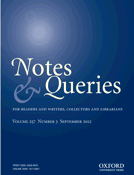
NOTES AND QUERIES
Scope & Guideline
Bridging Disciplines: Where Literary Studies Meet Linguistic Insight
Introduction
Aims and Scopes
- Textual Criticism and Manuscript Studies:
The journal frequently publishes articles that focus on the analysis of manuscripts, their provenance, and textual variants, contributing to a deeper understanding of historical literary works. - Authorship Attribution:
Numerous articles investigate authorship claims and attributions, particularly in the context of historical texts, providing clarity and new perspectives on literary history. - Intertextuality and Literary Influence:
The journal explores connections between texts, including allusions and influences among authors, enriching the dialogue between classical and contemporary literature. - Etymology and Linguistic Evolution:
Research published in the journal often examines the evolution of language and the etymology of terms within literary contexts, contributing to the understanding of linguistic history. - Historical Contextualization:
Many articles contextualize literary works within their historical settings, offering insights into the socio-political and cultural influences on authors and their writings.
Trending and Emerging
- Digital Humanities and Textual Analysis:
There is a noticeable increase in articles that utilize digital tools for textual analysis, reflecting a growing trend in the humanities to incorporate technology into literary studies. - Explorations of Lesser-Known Authors and Texts:
Recent issues feature a trend towards uncovering and analyzing works by lesser-known authors, which broadens the scope of literary scholarship and diversifies the canon. - Interdisciplinary Approaches:
A rising number of articles integrate insights from other disciplines, such as history and philosophy, showcasing a trend towards interdisciplinary scholarship that enriches literary analysis. - Focus on Language and Dialect Studies:
The journal is increasingly publishing studies that delve into regional dialects and the linguistic features of historical texts, highlighting the importance of language variation in literary studies.
Declining or Waning
- Modern Literary Criticism:
There appears to be a waning focus on contemporary literary criticism, with fewer articles engaging with modern texts and theories compared to earlier volumes. - Theoretical Frameworks in Literary Studies:
Discussions centered around specific literary theories, such as postcolonial or feminist theories, seem to be less frequent in recent issues, indicating a possible shift back towards more traditional analyses. - Broader Cultural Studies:
The journal has historically included articles that intersect with broader cultural studies; however, this interdisciplinary approach seems to be diminishing, with a more concentrated focus on literature alone.
Similar Journals
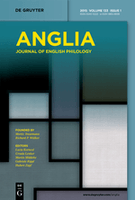
ANGLIA-ZEITSCHRIFT FUR ENGLISCHE PHILOLOGIE
Pioneering Insights in Linguistics Since 1878ANGLIA-ZEITSCHRIFT FUR ENGLISCHE PHILOLOGIE, published by WALTER DE GRUYTER GMBH, stands as a significant periodical in the fields of Linguistics and Literary Theory. With a rich publication history dating back to 1878 and ongoing contributions until 2024, this esteemed journal serves as a vital resource for researchers, professionals, and students interested in the evolution of the English language and literature. Although it does not currently offer open access, its rigorous peer-reviewed articles have secured a respectable standing, ranking Q3 in Linguistics and Language and Q2 in Literature and Literary Theory as of 2023. The journal, located in Berlin, Germany, continues to drive academic discourse and foster scholarly engagement in the intricacies of English philology, making it an essential platform for the latest research and developments in the field.

Perspectives Medievales-Revue d'epistemologie des Langues et Litteratures du Moyen Age
Advancing Interdisciplinary Insights into Medieval StudiesPerspectives Medievales-Revue d'epistemologie des Langues et Litteratures du Moyen Age is a distinguished academic journal dedicated to the exploration and analysis of medieval languages and literatures, providing a unique platform for interdisciplinary scholarship. Published by SOC LANGUE & LITTERATURE MEDIEVALES OC & OIL, this Open Access journal has been committed to advancing research and knowledge dissemination since 2009. It serves as a vital resource for researchers, professionals, and students interested in the complexities of medieval textuality and linguistics, encouraging innovative perspectives and critical dialogues within the field. With its broad scope encompassing various aspects of medieval studies, the journal aims to stimulate scholarly discussion and inspire future research endeavors. Located in Paris, France, Perspectives Medievales plays a crucial role in promoting the understanding and appreciation of medieval studies on a global scale, contributing to the rich tapestry of humanistic inquiry.

STUDI FRANCESI
Bridging History and Literature through Critical AnalysisSTUDI FRANCESI, published by Rosenberg & Sellier, is an esteemed journal in the fields of Cultural Studies, History, and Literature and Literary Theory. With an ISSN of 0039-2944, this journal has been a significant contributor to scholarly discourse since its inception in 1967. Operating from Turin, Italy, STUDI FRANCESI aims to explore and critical analyze the interplay between culture, literature, and historical context, reflecting diverse methodologies and perspectives that shape our understanding of the humanities. Despite being classified in Q4 quartiles according to the latest metrics, it offers a unique platform for emerging voices and innovative research, thus serving both seasoned academics and new researchers keen to delve into the nuances of Italian and European cultural heritage. Journals of this caliber are crucial for fostering academic dialogue and expanding the frontiers of knowledge, making it an invaluable resource for students, professionals, and scholars alike.
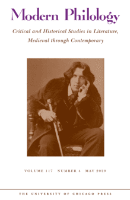
MODERN PHILOLOGY
Exploring the Intersection of Language and CultureMODERN PHILOLOGY is a distinguished academic journal published by the University of Chicago Press, dedicated to the exploration and advancement of knowledge in the fields of cultural studies, linguistics, and literary theory. Having commenced its publication in 1905, the journal continues to foster scholarly discourse and innovation through rigorous research and critical analysis, making it a vital resource for researchers, professionals, and students alike. With an ISSN of 0026-8232 and a commendable Scopus ranking, including a 69th percentile in Literature and Literary Theory, MODERN PHILOLOGY occupies a significant position within its respective quartiles (Q4) in the 2023 assessments. Although the journal does not currently offer open access, it remains a crucial platform for contributions that interrogate the complexities of language and literature. As a leading publication in its field, MODERN PHILOLOGY invites submissions that challenge conventional paradigms, encouraging a fresh examination of texts, contexts, and cultural phenomena from 1996 through 2024 and beyond.
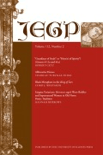
JOURNAL OF ENGLISH AND GERMANIC PHILOLOGY
Exploring the Depths of Linguistic HeritageJournal of English and Germanic Philology, published by University of Illinois Press, stands as a prestigious forum for scholarly discourse in the fields of linguistics and literary studies. With its ISSN 0363-6941 and an impressive impact factor aligning it within the Q1 and Q2 quartiles in key academic categories, this journal delves into nuanced explorations of both the English and Germanic languages, enriching the understanding of language and its literary frameworks. The journal aims to foster interdisciplinary dialogue, offering cutting-edge research that appeals not only to linguists and literary theorists but also to educators and cultural historians alike. Although the journal is not open access, its contributions are essential for anyone keen on enhancing their knowledge of linguistic phenomena and literary narratives from these influential linguistic traditions. With a commitment to publishing innovative and rigorous scholarship, the Journal of English and Germanic Philology is a vital resource for academics seeking to advance their work in language and literature.
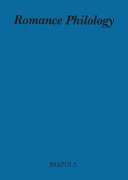
ROMANCE PHILOLOGY
Connecting Scholars through Passion for Language and LiteratureROMANCE PHILOLOGY is a distinguished academic journal dedicated to the exploration of language, literature, and linguistic theory within the Romance language family. Published by BREPOLS PUBL, it offers a platform for scholars, researchers, and practitioners to disseminate their findings and engage with the latest developments in these fields. The journal's impact factor reflects its standing, positioned within the Q4 category in Linguistics and Language and Q3 in Literature and Literary Theory for 2023, making it an essential resource for those studying Romance philology. Although coverage in Scopus was discontinued in 2021, the journal maintains a commitment to rigorous academic standards and comprehensive peer-review processes. With a broad scope encompassing theoretical and practical aspects of Romance languages and literatures, ROMANCE PHILOLOGY invites contributions that push the boundaries of knowledge and enrich the academic dialogue surrounding these vital areas of study. For those passionate about linguistic and literary pursuits, this journal stands as a significant gateway into the evolving discourse of Romance studies.

GLOTTA-ZEITSCHRIFT FUR GRIECHISCHE UND LATEINISCHE SPRACHE
Exploring the Depths of Ancient LinguisticsGLOTTA-ZEITSCHRIFT FUR GRIECHISCHE UND LATEINISCHE SPRACHE, published by Vandenhoeck & Ruprecht GmbH & Co KG, stands as a pivotal academic journal within the field of Classics and Linguistics, demonstrating a strong commitment to advancing scholarly discourse surrounding the Greek and Latin languages. With a respectable Scopus ranking placing it in the top 77th percentile for Classics, this journal facilitates the dissemination of high-quality research and insights relevant to linguists, philologists, and historians alike. The journal operates without an open access model, ensuring its niche scholarship remains exclusive yet profoundly impactful. The HIndex is indicative of its longstanding influence, with the journal traces its roots back to its inception, with weighted contributions across several pivotal years. Furthermore, the journal's current standing—positioned in the Q2 quartile for Classics and Q3 quartile for Linguistics—reflects its thriving relevance and aspiration towards academic excellence, offering a significant platform for the exchange of ideas within the global scholarly community. Researchers, professionals, and students are encouraged to engage with the journal's contributions, as it consistently reflects the evolving dialogue in the study of ancient languages.

REVUE BIBLIQUE
Illuminating the Depths of Cultural HeritageREVUE BIBLIQUE is a prestigious scholarly journal published by PEETERS, renowned for its contributions to the fields of Archaeology, History, and Religious Studies. Based in France and accessible internationally, this journal has been a vital resource for researchers and scholars since its inception, showcasing a commitment to high-quality academic discourse. Recognized within the Q1 and Q2 quartiles for various categories in the 2023 rankings, REVUE BIBLIQUE highlights critical examinations of historical contexts and religious texts, fostering interdisciplinary dialogue and innovation in the humanities. Although it operates under traditional subscription models, the journal’s rigorous peer-review process and comprehensive thematic coverage make it an indispensable tool for advancing knowledge in its domains. Scholars looking to delve into the complexities of faith, history, and cultural heritage will find REVUE BIBLIQUE an essential addition to their research arsenal.

Tyndale Bulletin
Igniting Conversations on Contemporary Religious IssuesTyndale Bulletin, published by Tyndale House, is a distinguished open access journal dedicated to the field of Religious Studies. With an ISSN of 0082-7118, the journal has been committed to scholarly excellence since its inception, providing a platform for critical academic discourse. Based in the United States and accessible globally, Tyndale Bulletin has shifted to an open access model since 2021, reflecting its commitment to wider dissemination of research and enhancing accessibility for researchers, professionals, and students alike. Despite ranking in the Q4 category of 2023 within Religious Studies and being positioned at the 18th percentile in its Scopus rank, it continues to contribute meaningfully to the scholarly community by publishing original research, reviews, and theological discussions. The journal invites contributions that engage with contemporary issues in religious thought and practice, making it a valuable resource for anyone interested in deepening their understanding of religious studies.

Monteagudo
Illuminating Contemporary Issues in Arts and HumanitiesMonteagudo, published by UNIV MURCIA, is an important academic journal dedicated to the fields of Arts and Humanities, particularly focusing on Literature, Literary Theory, Visual Arts, and Linguistics. Since its inception in 2019, it has aimed to provide a scholarly platform for innovative research and critical discourse within these disciplines. With an ISSN of 0580-6712 and an E-ISSN of 1989-6166, the journal seeks to enhance the visibility of emerging ideas and methodologies, while fostering an inclusive academic dialogue. Although Monteagudo does not currently offer Open Access options, its significance is reflected in its Scopus rankings, which position it within the 14th to 32nd percentile across various categories. With its operations based in the heart of Murcia, Spain, the journal is poised to influence both regional and international scholarly conversations, making it an essential resource for researchers, professionals, and students aiming to expand their understanding of contemporary issues in Arts and Humanities.